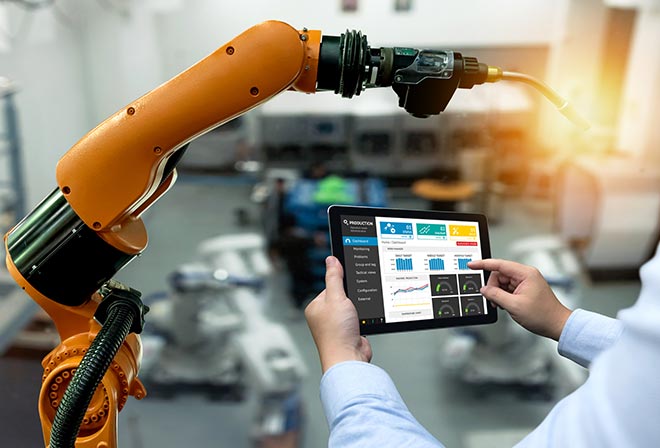Digital Readiness
Article
Automating manufacturing to compete on a global scale
 Despite a few false starts, Midlands manufacturer JJ Churchill is committed to taking a gamble and making big investments in new productivity-focused strategies
Despite a few false starts, Midlands manufacturer JJ Churchill is committed to taking a gamble and making big investments in new productivity-focused strategies
JJ Churchill’s first radical move to remain competitive was in setting up a Mexican facility, where labour was much cheaper. The timing, however, could not have been worse.
The factory was set up to produce gas turbine blades for the oil and gas industry, and it opened just as the oil price collapsed. The only option was to close the facility. If this drastic decision wasn’t made, JJ Churchill would likely have gone out of business.
A family business manufacturing components for aerospace, energy and defence from its long-term base in Nuneaton, JJ Churchill has a staff of 140 and is led by executive chairman Andrew Churchill.
“Global cost competitiveness is the absolute essence for aerospace, because they’re very small, very high-value parts,” he explained. “You can air freight those parts anywhere at marginal cost and therefore we are competing head-on against Mexico, India, China.”
Investing in automating manufacturing
Technology has now moved on, meaning JJ Churchill can use automation to manufacture the parts in the UK but keep labour costs down. The company is thinking big by making a £1.2m investment in technology to boost productivity.
While state-of-the-art grinding and measuring machines will still be used to produce the parts, productivity improvements will be made by implementing robotics to pick and place parts into these machines. Software will instruct the machines, analyse parts, and use machine learning to adjust processes as necessary.
This should result in a big increase in capacity, Churchill said. “The robotics will give us the ability to sweat our machine tools more effectively. It will enable us to run smoother around the clock. We should also get better predictability, because we’re removing a number of the human-based variables.”
The hardware, Churchill revealed, is the cheapest part of the investment. “It’s off the shelf and very straightforward.” Slightly more complex, and therefore more expensive, is the software to integrate the vital components.
The decision-making process
It was a unanimous decision to make the investment in automating manfuacturing and Churchill said the company would not have moved forward otherwise. He also believes JJ Churchill retains the benefits of being a mid-sized company. “We’re a relatively small board and that means we can meet informally. We’re based on one site and once we agree, we can move forward in a very agile manner. If it’s in-line with the strategy, and if the data says it’s the right thing to do, we’ll move ahead with it.”
Companies of all shapes and sizes, Churchill things, should have a strategic plan in place before undertaking any major investments in productivity, with “absolute clarity” on the sectors being targeted, and therefore what technologies are needed to make a success of that, vital.
He said business leaders should test their company’s resilience under a variety of different scenarios, and the potential impact on the cash profile. They must also be clear on how success will be measured. “It’s no good making those investments if you don’t know what success is going to look like.” Companies need to establish what metrics will be tracked, determine a base-line value and the degree of improvement required to remain cost-competitive.
Back-office operations
JJ Churchill is looking to change its entire enterprise software system – which deals with everything from accounts through to order processing – to deal with the expected growth. Its existing system to analyse the huge amounts of data produced is around a decade old and involves mountains of offline spreadsheets.
“Whilst they are very powerful, [these spreadsheets] are dumb, they are not real-time, and they are out of date the moment you produce them. The opportunity with newer business information systems is to run all of that analysis in real-time,” Churchill said.
Investing in an uncertain climate
The 81 year-old operation does not expect to cut any of its staff as a result of its investment in technology. Instead, it hopes to drive revenue growth at a faster rate than headcount. The aim is to treble revenues over the next five years, while staff numbers will likely increase to around 180 people.
Churchill, layering technology into a business his grandfather set up during World War II, said the company will also need to change the balance of talent it has in-house – creating opportunities for new recruitment.
As the investment is still underway, Churchill is not yet able to showcase tangible results. “I don’t know what the outcome is but, if I don’t do something different, my cost to manufacture will not be globally competitive and therefore I’ve got to innovate.”
The company is going ahead with the investment despite the uncertainty posed by Brexit. “Whatever we can do to improve our competitiveness will pay dividends, no matter what the outcome.”
If you’re interested in streamlining business operations then utilise our benchmarking tool. We’ve also got some helpful quick tips below.